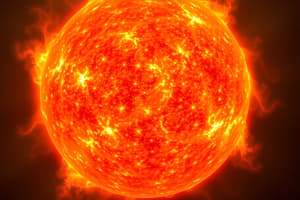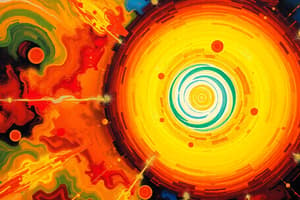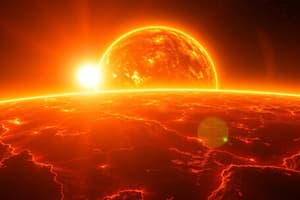Podcast
Questions and Answers
Was ist Astrophysik?
Was ist Astrophysik?
Astrophysik ist ein Zweig der Astronomie, der die Prinzipien der Physik und Chemie verwendet, um den Ursprung, die Entwicklung und das letztendliche Schicksal des Universums zu erklären.
Was ist Radioaktivität?
Was ist Radioaktivität?
Radioaktivität ist eine Eigenschaft bestimmter Atome, die als Radioisotope bezeichnet werden und Partikel oder Energie in Form von ionisierender Strahlung emittieren.
Was beinhaltet die Kosmologie?
Was beinhaltet die Kosmologie?
Die Kosmologie beinhaltet die Untersuchung des Universums als Ganzes, einschließlich seiner Ursprünge, Entwicklung und letztendlichen Schicksal.
Was ist Planetenphysik?
Was ist Planetenphysik?
Was sind nukleare Reaktoren?
Was sind nukleare Reaktoren?
Was versteht man unter Kernreaktionen in Bezug auf die Radioaktivität?
Was versteht man unter Kernreaktionen in Bezug auf die Radioaktivität?
Wie wird in der nuklearen Medizin die Diagnose und Behandlung von Krankheiten durchgeführt?
Wie wird in der nuklearen Medizin die Diagnose und Behandlung von Krankheiten durchgeführt?
Warum ist nuklearer Abfall ein Umweltproblem?
Warum ist nuklearer Abfall ein Umweltproblem?
Wie funktioniert die Energieerzeugung in Kernreaktoren?
Wie funktioniert die Energieerzeugung in Kernreaktoren?
Welche Rolle spielen Radiotracer in der nuklearen Medizin?
Welche Rolle spielen Radiotracer in der nuklearen Medizin?
Flashcards are hidden until you start studying
Study Notes
Astrophysics
Astrophysics is a branch of astronomy that uses the principles of physics and chemistry to explain the origin, evolution, and eventual fate of the universe. It involves the study of celestial objects and phenomena, such as stars, galaxies, and black holes, as well as the fundamental laws of physics that govern their behavior.
Cosmology
Cosmology is the study of the universe as a whole, including its origins, evolution, and eventual fate. It involves the study of the large-scale structure of the universe, the distribution of matter and energy, and the fundamental laws of physics that govern its behavior.
Planetary Physics
Planetary physics is the study of the physical properties of planets, including their composition, structure, and behavior. It involves the study of the planets in our solar system, as well as those around other stars (exoplanets).
Radioaktivität (Nuclear Physics)
Radioactivity is a property of certain atoms, called radioisotopes, that emit particles or energy in the form of ionizing radiation. This property is due to the instability of the atom's nucleus, which can decay through various processes, including alpha decay, beta decay, and gamma decay.
Nuclear Reactors
Nuclear reactors are devices that use the heat generated by nuclear reactions to produce electricity. They work by controlling a chain reaction in which the nuclei of atoms emit neutrons, which then cause other atomic nuclei to split and release more neutrons, producing a self-sustaining reaction.
Nuclear Medicine
Nuclear medicine is a medical specialty that uses radioactive isotopes to diagnose and treat diseases. It involves the use of radioactive drugs, called radiotracers, which are taken up by specific cells or tissues and can be detected by specialized imaging devices, such as positron emission tomography (PET) scanners.
Nuclear Waste
Nuclear waste is the byproduct of nuclear reactions, including spent fuel from nuclear reactors and waste from nuclear medicine. It is a significant environmental concern due to the long-term radioactivity of some of these materials, which can pose a risk to human health and the environment if not properly managed and stored.
Studying That Suits You
Use AI to generate personalized quizzes and flashcards to suit your learning preferences.




